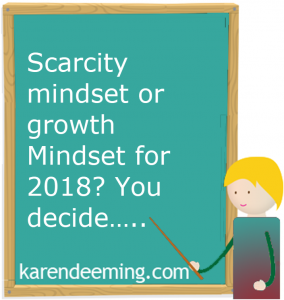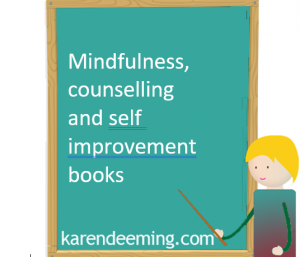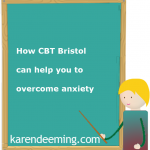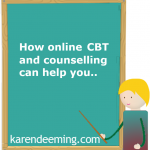

In response to Coronavirus (Covid-19), I am offering telephone, online counselling and CBT sessions via Zoom and WhatsApp.
More Details Here
Why is it no matter how much time most people are given, they often finish jobs or tasks at the last minute and are left feeling completely stressed out?
• Why is it that very high wage earners end up broke?
• Why do organisations get stuck firefighting?
• Why do the lonely find it hard to make friends or to find a partner?
• Why do most New Year Resolutions fail by February?
These questions seem unconnected, yet drawing on a raft of research in psychology and behavioural economics, Harvard economist Mullainathan and Princeton psychologist Shafir illustrate that they are all examples of a mind-set produced by scarcity. Put simply, you and most people, often force the brain to focus on alleviating pressing shortages and thus reducing the mental bandwidth available to address other needs such as:
• planning ahead
• exert self-control
• problem solving
The result these academics argue, is a life fixated on agonising trade-offs, crises, and preoccupations that impose persistent negative thinking and self defeating actions.
How can you re programme your scarcity mindset and develop a healthier growth mindset instead so that you can get the most out of your counselling or mindfulness sessions at work or in your personal life?
According to Psychology today, “making resolutions or new habits work is essentially changing behaviors and in order to do that, you have to change your thinking and “rewire” your brain. Brain scientists such as Antonio Damasio and Joseph LeDoux and psychotherapist Stephen Hayes have discovered, through the use of MRIs, that habitual behavior is created by thinking patterns that create neural pathways and memories, which become the default basis for your behavior when you’re faced with a choice or decision. Trying to change that default thinking by “not trying to do it,” in effect just strengthens it. Change requires creating new neural pathways from new thinking.”
Here’s some more Neuroscience research relating to scarcity mindsets which can have a huge impact on your counselling, mindfulness and coaching sessions:
• We recall negative feedback more than we remember praise.
• Unpleasant events tend to be more memorable than pleasant ones.
• The brain is programmed to be vigilant and wary.
• The brain reacts more strongly to negative stimuli than to positive stimuli.
Studies indicate that there’s a greater flow in electrical activity in the brain when we visualise a negative image such as a dead cat than when we witness something positive like a glass of prosecco or yummy lemon cheesecake.
How can Neuroscience and a knowledge of the brain help you to develop a growth mindset and the best return on investment on your counselling coaching and mindfulness sessions?
For those of you who are unfamiliar, Neuroscience is the study of how the nervous system develops, its structure, and what it does. Neuroscientists focus primarily on the brain and its impact on behaviour and cognitive functions.
Neuroscience is an increasingly wide ranging subject. Perhaps because the brain is one of the most complex structures in the known universe:
• intricate enough to coordinate the fingers of a classical violinist
• or logical enough to introduce the laws and theories of gravity.
Now let’s take a brief glimpse at the brain:
The right hemisphere is generally associated with creativity, communicating emotion, analysis of nonverbal information and the control of the left side of the body, temporal and spatial relationships.
Whereas, the left hemisphere is usually identified with logic abilities, casual relationships, sequential thinking, controlling the right side of the body and producing/understanding language and complexities.
The limbic system sometimes referred to as the “emotional brain” is usually considered as composed of the following:
cingulate gyrus, hypothalamus, hippocampus, thalamus and amygdala.
It is the site of: emotional states and behaviour; the bridge between the conscious and subconscious brain and short term memory/ information storage, especially short term recognition of facts, objects, people etc.
The amygdala, the brain’s alarm system is located in the limbic system. Its key function is to call you to attention, and in an emergency, to mobilise or shut-down your body and mind so that you’ll survive.
Sadly though, this alarm rings automatically and unnecessarily often incorrectly informing you that you are experiencing a flight or fight situation when the actual reality is that you are not and the alarm is just being over cautious.
When our amygdala misinterprets a bodily sensation such as sinking stomach to be a message of despair and pessimism, it has exactly the wrong result, reducing rather than enhancing our attention and alertness.
That’s why anxiety, frustration, anger and other chronic stress reactions can occasionally, or for some people frequently, escalate into huge problems.
Put simply, we’re not using our amygdala as effectively as it was intended.
Mindfulness strategies can help to reprogramme your brain’s natural tendency to focus on scarcity rather than on the positives of a situation:
When you experience a negative thought, feeling or physical sensation, breathe, pause, step back then ask yourself the following question:
“what do I know?”
“I know that if I allow my negative thoughts to take over it is not healthy for me and leaves me feeling anxious, I also know that though I can’t stop my thoughts, feelings or physical sensations, I can change what happens next, such as, consciously deciding to stop myself from catastrophising or getting too attached to my thoughts.”
“I know that thoughts aren’t facts”
Following your attempts at implementing the above strategy, record on a piece of paper the process of what happens when you try this technique and the automatic negative thoughts that stop you from supporting yourself.
Now, let’s take a real life example of a person wanting to create their dream life:
Instead of focusing on scarcity and deprivation by talking yourself out of it by getting into a negative thinking style of what ifs, buts, shoulds etc, ie scarcity, approach your dream life by placing yourself in a growth mindset:
Here’s how:
(1) firstly, create your own life script by writing down a series of positive affirmations on a piece of paper or on your tablet such as:
“I’m really happy and grateful for all the following things that I’m just about to say:
I’m really happy and grateful to be a wildly successful writer and public speaker, and wife with an endless regular weekly supply of income that greatly exceeds my outgoings.
What’s also wonderful is that my work is mostly daytime and online so I can do it anywhere in the world.
I have over 5,000 twitter and instagram followers and I’m thrilled that my fiction book is a best seller.
I have great health and I’m really enjoying a good work life balance with lots of time to relax and exercise to play piano and make jewellery and other creative activities.
My life is full of fun and joy and I have an abundance of male and female friends that bring out the best in me in Wiltshire and in other parts of the UK .
And I’m open to receiving this and more thank you.”
Repeat this at least once each morning and then just before you go to sleep for at least a six week period.
(tip: ensure all statements are in the present tense as if they are happening right now and avoid using words such as not, never, no longer etc)
(2) then, cut out some images/photos from either a magazine or the internet relating to your life script and arrange them on a piece of paper or on a cork memo board/whiteboard. Alternatively, create a collage by using pinterest or instagram.
What is key here is to look at the relevant image/photo whilst you are reading each affirmation out loud (ideally smiling and with heaps of enthusiasm and belief!)
(3) Be mindful. Become physically, emotionally and mentally aware of your inner state as each external event happens, moment by moment, rather than living in the past or future
(4) Last but not least, reflect on this statement: you never fail if you never give up
In other words, it’s about moderation not deprivation and adopting a small steps approach such as and be patient…
Sounds simple and perhaps mumbo jumbo doesn’t it? However, I have used this technique with several clients and friends to help them tackle issues such as:
• overcoming procrastination
• overcoming addictions
• overcoming shyness and social phobia
• overcoming anxiety and exhaustion
• overcoming loneliness
The results have often been astounding. Having said that though, most of these clients have undertaken a few counselling or coaching sessions with me, Karen Deeming, before adopting the above exercise in order to achieve their goals.
What’s the primary principle behind this techique? The subconscious mind operates 95% of your life and only 5% of what you are thinking or perceiving is your conscious mind.
The subconscious mind works most effectively with pictures and imagery so you want to take advantage of that, ie the photos. Once you train your subconscious mind to focus on the things that you want then your performance starts to follow because your performance is always aligned with your subconscious mind.
Also as children we picked up messages from parents, peers, teachers and society, not always positive, that literally form the 95% that we are not conscious of and this 95% is really running the show often resulting in fears and doubts that cause us to procrastinate or to feel stuck and demotivated.
For example:
• don’t dream like this
• you can never have this kind of house
• don’t set yourself up for failure
• you can never run your own business it’s too risky
We then blame our doubts and fears on the external world and we play the victim but the reality is it is our own selfs we are our own saboteurs.
The creating your dream life exercise is an ideal tool to reprogramme your subconscious and of course your unhealthy, scarcity mindset.
Does any of this sound familiar? What can you do about it?
Be honest with yourself and acknowledge that you’ve probably fallen victim to the scarcity trap and mind set. Naturally, the reason will be different for each person and remember you’re not alone in this very common dilemma…
Take control of your negative internal chatter box alias “inner critic”.
Over to you:
If after reading this blog, you are still struggling to overcome your scarcity mindset and are feeling overwhelmed with distractions and negative thoughts don’t panic or give up just yet.
Coaching, counselling or a mindfulness course can help you.
So, if you need a bit of extra support and encouragement and a few on line or face to face counselling or mindfulness sessions why not contact me to arrange an appointment for a short free introductory chat on 07950 751352 or by emailing me at karen@karendeeming.com
I’ll end with a few growth mindset insights that have helped me, Karen Deeming, along the way:
• whatever is going on in your mind is what you are attracting
• happy feelings will attract more happy circumstances
• visualize and rehearse your own future
• shift your awareness
Counselling and coaching is about personal growth and development and encouraging people to discover their potential for living as well as for people with anxiety, depression, stress, bereavement, low self esteem, and relationship difficulties. You can book your appointment here or you can contact me on (044) +7950 751352 for outside the UK or 07950 751352 inside the UK. Alternatively by email: karen@karendeeming.com.





![Karen_Deeminga[1]](http://www.karendeeming.com/wp-content/uploads/2015/09/being-practice-self-portrait-e1541437891746.jpg) Welcome to my site. if you have any queries then please
Welcome to my site. if you have any queries then please

